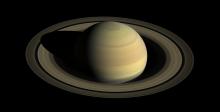Listen to today's episode of StarDate on the web the same day it airs in high-quality streaming audio without any extra ads or announcements. Choose a $8 one-month pass, or listen every day for a year for just $30.
You are here
Autumn
Fall arrives in the northern hemisphere this weekend. It’s the autumnal equinox — the point at which the Sun crosses the equator from north to south.
You probably noticed that we used two names for the season: fall and autumn. In the modern world, it’s the only season with more than one common name.
According to language experts, the season didn’t have any names until fairly recently. In fact, there wasn’t much of a concept of the season itself. In the western world, most cultures thought mainly of winter and summer — the two extremes. The transition periods between them received less attention.
By the 12th or 13th century, though, the word “harvest” first appeared as a name for the transition from summer to winter.
“Autumn” turned up a century or two later. It was adopted from a similar word in French, or from the even earlier Latin word “autumnus.” And the phrases “spring of the year” and “fall of the year” appeared a century or two after that — marking times of warmth and growth on one hand, and cold and decay on the other. Those phrases soon were shortened to just “spring” and “fall.”
Even then, there wasn’t much agreement on just what the fall season encompassed. It could start in August or September and end during November or December. A precise definition didn’t come along until we started relying on the positions of the Sun. So now, fall — or autumn — begins on the September equinox — coming up at 8:54 p.m. Central Time on Saturday.
Script by Damond Benningfield






